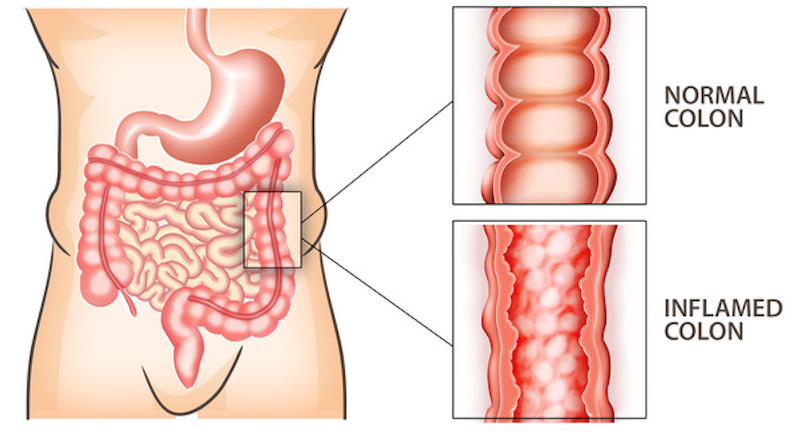Inflammatory Bowel Disease

Inflammatory bowel disease (IBD) involves the chronic inflammation of all or part of the digestive tract. Crohn’s disease and ulcerative colitis are the most common types of inflammatory bowel disease. Crohn’s disease causes inflammation of the lining of the digestive tract and often spreads deep into the affected tissues. Crohn’s disease can affect the small intestine, large intestine or both. Ulcerative colitis causes long lasting inflammation and ulcers in the inner lining of the large intestine and rectum.
Symptoms of IBD include blood in stool, severe diarrhea, pain, fatigue and weight loss. IBD can be debilitating to affected individuals and in some cases, can lead to life-threatening complications. The blood found in stool can range from bright red to black depending on the affected area, it is also possible that the bleeding is not visible.
IBD is commonly treated with a mixture of lifestyle changes and a combination of medications that can include, anti-inflammatory drugs, steroids, antibiotics and/or immune system depressors. In severe cases, surgery is required to remove the affected areas.
More from Things Health
-
Visual Signs of Poor Health That You Probably Ignore (But Shouldn't)
We often think that being diagnosed with an illness such as diabetes, heart disease, stroke or cancer as something that happens out of the blue.…
-
10 Serious Conditions That Rashes And Hives Can Indicate
Hives, also known as Urticaria in medical terms, is a frequent symptom that is experienced by people with allergies to various medication, foods, and viral…
-
Symptoms Of An Ulcer
A peptic ulcer is an open sore in the top digestion tract. Both primary kinds of peptic ulcers, a gastric ulcer, which forms in the…
-
Treat Constipation At Home With These Common Foods
Constipation is a condition where there is difficulty in emptying the bowels, in most cases, due to hardened feces. In most cases, constipation is related…
-
Liver Disease And Chronic Fatigue
50 percent of the sufferers with an underlying liver condition show no symptoms of the disease. The symptoms are actually very regular, as for instance…






